Books
War Babies: The Generation That Changed America
Available online at Amazon.com
Available online at BarnesandNoble.com
Available locally (Austin) and online at BookPeople.com
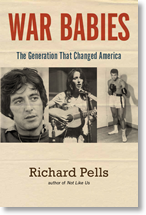 Pells’s most recent book—War Babies: The Generation That Changed America—takes on a different subject from his first four books. It analyzes the impact of the generation of Americans born between 1939 and 1945 in transforming American culture and politics over the past fifty years. No one has written a book about these people as members of a distinctive generation with their own unique experiences and values. The book studies the influence of singer/songwriters like Bob Dylan, Joan Baez, and Paul Simon; movie directors like Francis Ford Coppola and Martin Scorsese; actors like Robert De Niro and Al Pacino; journalists like Bob Woodward and Carl Bernstein; and social activists like Jesse Jackson and Muhammad Ali; as well as many others in the fields of culture and politics. While not a memoir, the book is partly personal since Pells himself was a war baby, born in 1941.
Pells’s most recent book—War Babies: The Generation That Changed America—takes on a different subject from his first four books. It analyzes the impact of the generation of Americans born between 1939 and 1945 in transforming American culture and politics over the past fifty years. No one has written a book about these people as members of a distinctive generation with their own unique experiences and values. The book studies the influence of singer/songwriters like Bob Dylan, Joan Baez, and Paul Simon; movie directors like Francis Ford Coppola and Martin Scorsese; actors like Robert De Niro and Al Pacino; journalists like Bob Woodward and Carl Bernstein; and social activists like Jesse Jackson and Muhammad Ali; as well as many others in the fields of culture and politics. While not a memoir, the book is partly personal since Pells himself was a war baby, born in 1941.
Modernist America: Art, Music, Movies, and the Globalization of American Culture
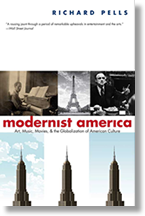 In his fourth book, Modernist America: Art, Music, Movies, and the Globalization of American Culture, Pells reverses the focus of Not Like Us, arguing that the cultural relationship between the United States and the rest of the world has been reciprocal, never one-sided, and that Americans have been as dependent on foreign intellectual and artistic influences as they have been shapers of foreign entertainment and tastes. Pells especially shows how the European modernist movement of the 20th century influenced American painters like Jackson Pollock; composers like George Gershwin, Irving Berlin, and Cole Porter; jazz musicians like Charlie Parker, Dizzy Gillespie, and Miles Davis; film directors like Orson Welles, Elia Kazan, Woody Allen, Robert Altman, and Quentin Tarantino; and actors like Marlon Brando. It was these transnational influences that created a global culture for the modern world.
In his fourth book, Modernist America: Art, Music, Movies, and the Globalization of American Culture, Pells reverses the focus of Not Like Us, arguing that the cultural relationship between the United States and the rest of the world has been reciprocal, never one-sided, and that Americans have been as dependent on foreign intellectual and artistic influences as they have been shapers of foreign entertainment and tastes. Pells especially shows how the European modernist movement of the 20th century influenced American painters like Jackson Pollock; composers like George Gershwin, Irving Berlin, and Cole Porter; jazz musicians like Charlie Parker, Dizzy Gillespie, and Miles Davis; film directors like Orson Welles, Elia Kazan, Woody Allen, Robert Altman, and Quentin Tarantino; and actors like Marlon Brando. It was these transnational influences that created a global culture for the modern world.
Not Like Us: How Europeans Have Loved, Hated, and Transformed American Culture Since World War II
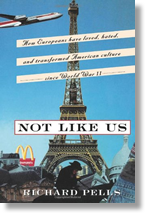 Pells’ experiences resulted in his third book, Not Like Us: How Europeans Have Loved, Hated, and Transformed American Culture Since World War II. The book studies the ways that America tried to remake Europe in its own image, and how the Europeans successfully retained their identities in the face of American mass culture. Essentially the book debunks the idea that Europe (and by implication the rest of the world) was “Americanized.”
Pells’ experiences resulted in his third book, Not Like Us: How Europeans Have Loved, Hated, and Transformed American Culture Since World War II. The book studies the ways that America tried to remake Europe in its own image, and how the Europeans successfully retained their identities in the face of American mass culture. Essentially the book debunks the idea that Europe (and by implication the rest of the world) was “Americanized.”
The Liberal Mind in a Conservative Age: American Intellectuals in the 1940s and 1950s
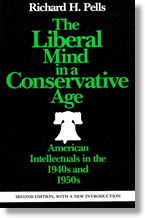 Pells’ second book was The Liberal Mind in a Conservative Age: American Intellectuals in the 1940s and 1950s. In some ways a sequel to Radical Visions, the book focused on social critics like David Riesman, C, Wright Mills, and John Kenneth Galbraith, as well as on how many other intellectuals tried to define a new form of liberalism in the midst of the Cold War and McCarthyism.
Pells’ second book was The Liberal Mind in a Conservative Age: American Intellectuals in the 1940s and 1950s. In some ways a sequel to Radical Visions, the book focused on social critics like David Riesman, C, Wright Mills, and John Kenneth Galbraith, as well as on how many other intellectuals tried to define a new form of liberalism in the midst of the Cold War and McCarthyism.
After his second book, Pells became increasingly interested in transnational cultures. This interest sprang from his experiences as a visiting professor and lecturer in almost every country in Europe, as well as in Turkey, Brazil, Australia, Korea, Indonesia, and most of southeast Asia.
Radical Visions and American Dreams: Culture and Social Thought in the Depression Years
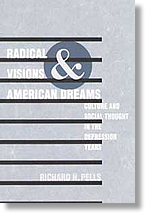 Pells’s first book was Radical Visions and American Dreams: Culture and Social Thought in the Depression Years. The book dealt with the way novelists, filmmakers, playwrights, and social critics responded to the gravest crisis in modern American history, and how they reacted to the influence of Communism and the coming of World War II. The book became a standard interpretation of American cultural life in the 1930s.
Pells’s first book was Radical Visions and American Dreams: Culture and Social Thought in the Depression Years. The book dealt with the way novelists, filmmakers, playwrights, and social critics responded to the gravest crisis in modern American history, and how they reacted to the influence of Communism and the coming of World War II. The book became a standard interpretation of American cultural life in the 1930s.